
On January 24, the ENGIE Foundation celebrates International Education Day.
According to UNESCO, 250 million children and young people do not go to school, while 763 million adults lack basic literacy skills.
The ENGIE Foundation wants to give the most vulnerable children the energy to learn and grow in a positive environment and is convinced that children will build tomorrow’s world; giving them the energy to act is vital for the future of the planet.
The Foundation supports projects that promote education for as many people as possible, in France and abroad, around 3 themes:
- Education through sharing, transmission and discovery
- Educating for academic success
- Education to improve living conditions for children.
Education through sharing, transmission and discovery
UNESCO CAMPUS: Understand contemporary issues and become an agent of change.
Since its creation, UNESCO’s aim has been to support global access to education, to fulfill its mandate of building peace through international cooperation in education, science and culture.
UNESCO and the ENGIE Foundation have launched the Campus program to help young people better understand major contemporary issues and their role as young citizens.
Drawing on the knowledge of various UNESCO and civil society speakers, experts in their fields (technology, education, science, etc.), the UNESCO Campuses aim to tackle today’s challenges with middle and high school students in the form of a free, horizontal discussion.
The aim is to inform, raise awareness and mobilize young people around major social and environmental issues.
IMPACT: UNESCO CAMPUS has reached 25,000 young people since 2014, of whom 5,500 have taken part in the online Campuses (for a total of 145 countries reached).
This CAMPUS scheme is incidentally an important vector for raising awareness of the key issues carried out by UNESCO, building its image among a young audience, as well as a strong relational tool between UNESCO and teachers.
By 2022-2023:
- 8 online campuses
- 1 face-to-face at UNESCO headquarters
- 36 schools involved.
- 1577 students
The ENGIE Foundation is supporting the campuses on biodiversity and the oceans, Access to science for all, themes for the years 2023-2024.
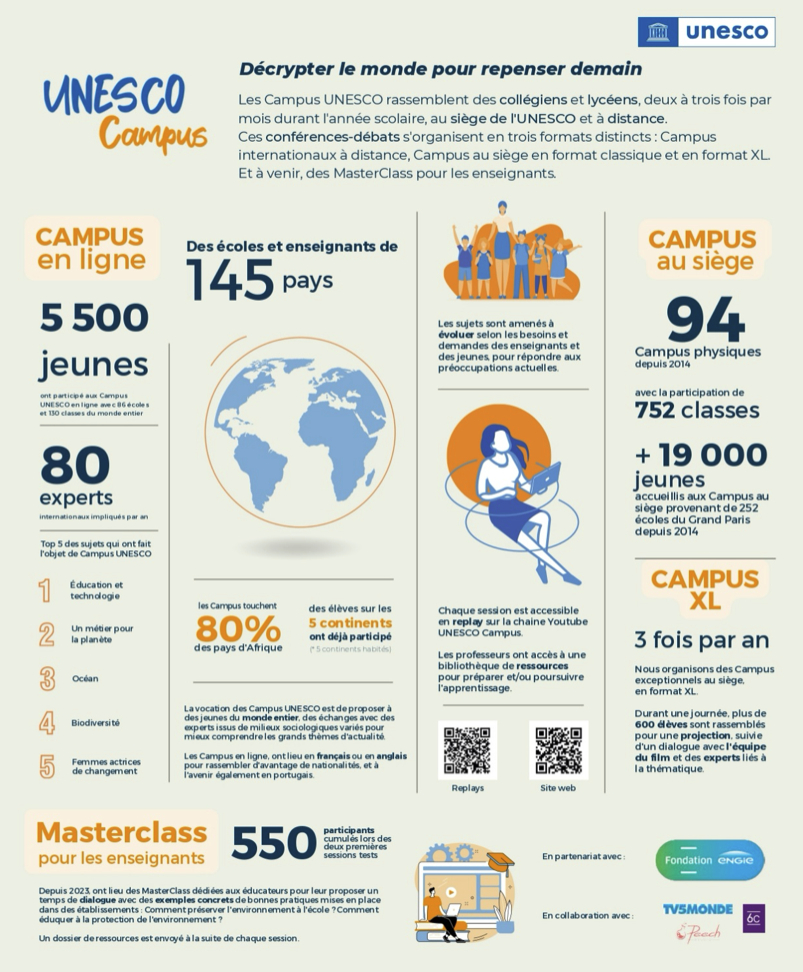
Campus Sciences et Filles online
Promoting diversity and girls' access to science with ENS Paris-Saclay
As part of its equal opportunities plan, ENS Paris-Saclay is involved in several programs designed to help young people (high school, middle school and high school students), particularly girls, gain access to higher education and research careers.
The ENGIE Foundation has made access to science a priority in its education program.
That is why the ENGIE Foundation is supporting ENS Paris-Saclay for 2 school years in its science awareness programs for young people (especially girls), to:
- stimulate young people’s interest in science,
- boost the academic ambitions of young people from a variety of socio-territorial backgrounds, and of girls,
- limit self-censorship.
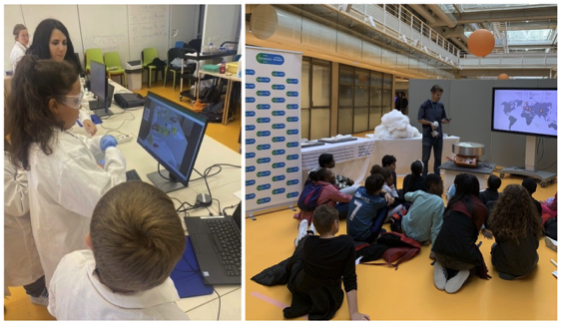
On October 6, as part of the Fete de la Science 2023, ENS Paris-Saclay organized the Village des Sciences for 700 youngsters.
Teacher-researchers, doctoral candidates and students welcomed 300 primary school pupils to several “Mini Researchers” workshops in all scientific disciplines, in the presence of Nathalie Carrasco, President of the School, and Anne PEYROCHE, Vice-President in charge of strategy and resources.
With Toutes à l'école, environmental education for girls in Cambodia
The Toutes à l’école association, founded by journalist Tina Kieffer in 2005, aims to bring a prominent level of education to the poorest girls in Cambodia, so that they can become free, educated women.
Every year, 100 new girls aged 5 to 6 from the poorest families join the Happy Chandara campus in the suburbs of Phnom Penh, Cambodia, from kindergarten onwards. They will have the opportunity to pursue a high-level curriculum in kindergarten, primary school, junior high and high school, taught in Khmer, English and French.
The action continues with young baccalaureate students continuing their studies, who are accommodated in the two Chandara Students’ Homes in Phnom Penh, where they build an independent adult life in a secure environment.
As early as 2016, sensing the scale of the climate crisis, the association integrated our first environmental protection courses into its educational program and created permaculture vegetable gardens within the Happy Chandara campus.
Today, the IPCC report is clear: Cambodia is one of the country’s most vulnerable to global warming.
The association aims to make Happy Chandara the first entirely green pilot school in Cambodia.
The ENGIE Foundation supports the creation of the Green Team
The Green Team is made up of trainee engineers from the Grandes Ecoles (Ecole Polytechnique, Ecole Centrale – Supélec Paris and Lyon), agronomists or communication schools such as Celsa, all of whom are passionate about environmental issues. They design educational tools, run workshops with our students and prototype projects (such as greening spaces and creating educational videos).
Trainees lead:
- Awareness-raising workshops on the ecological transition for students and campus staff.
- Organic soap-making workshops for boarding schools and hygiene baskets for families.
- Paper recycling workshops for postcards sent three times a year to student sponsors.
- Eco-committees with our students.
- Plastic collections around the school and alongside institutional partners in the capital Phnom Penh.
To give students access to the best training, the association has forged partnerships with universities and Grandes écoles in Europe and around the world.
The ENGIE Foundation is supporting a student, TOLA CHHORN, with a scholarship to the Ecole des Mines.
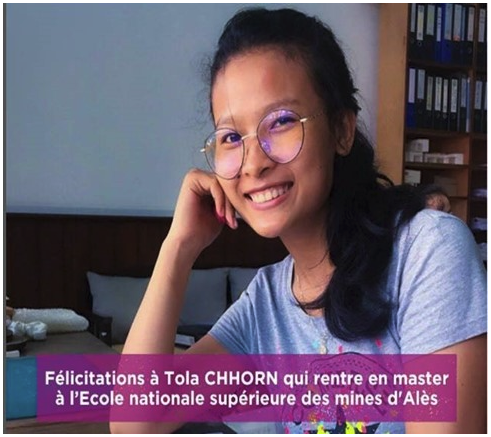
Culture with the 10 Months of School and Opera program, discovering the professions at the Paris Opera

The ENGIE Foundation, patron of the Académie de l’Opéra de Paris, supports the 10 mois d’Ecole et d’Opéra program
The Paris Opera’s 10 Months of School and Opera program aims to promote equal opportunities and academic success for pupils in priority education networks. This long-standing partnership with the Paris and Versailles education authorities is continuing to develop in Corsica, Centre-Val de Loire and Normandy.
IMPACT
In collaboration with the educational teams at each school, the Paris Opera is involved in innovative teaching methods that reach over 900 students each season, from nursery school to vocational high school.
RESULTS:
- 60% of beneficiaries improve their writing skills.
- +25% exam pass rate.
A SENSITIVE ENCOUNTER WITH OPERA
Experiencing a performance is the first step in learning about the history and heritage of the Opéra national de Paris. Every season, students attend rehearsals and performances of ballets and operas at the Palais Garnier and Opéra Bastille. These encounters with works at distinct stages of creation enable students to develop their viewer’s eye and acquire new knowledge.
Meeting professionals from the Opéra national de Paris in theaters or classrooms is a high point in the students’ careers, nurturing the dreams of some and the vocations of others by making opera a future.
ARTISTIC PRACTICE AT SCHOOL
In partnership with teaching teams, professional artists set up practical artistic workshops – music, singing, dance, theater, visual arts, etc. – during school hours. – during school hours.
As an integral part of students’ school lives, these workshops provide an opportunity for each student to learn about the creative process and develop an awareness of others in a context of artistic expression.
A SPECIAL SCHEME: “SHOW” CLASSES
Each year, two classes – one from the Versailles academy, the other from the Paris academy – are selected to take part in this program. Artists offer students three-hour weekly workshops during school hours, in the belief that intense artistic practice can be a key factor in academic success.
The “performance” classes meet at the Opéra for “immersion” days, leading to the creation of a show performed at the Opéra Bastille Amphitheatre in June.
Vocational high school classes in costume, hair and make-up take part in the creation of the show.
Educating for academic success
With Fête le Mur: programs focused on academic success
Founded by Yannick Noah over 20 years ago, the Fête le Mur association enables children from disadvantaged housing estates to play tennis in the heart of their neighborhoods, under the supervision of professional tennis coaches. Since its creation, the association has been offering educational support to young beneficiaries at some of its sites throughout the year.
The ENGIE Foundation celebrates 25 years of partnership with Fête le Mur.

Vacances Educ’Actives
Since 2020, the academic difficulties observed during confinement have led them to develop school vacation courses combining sports activities and academic support: Vacances Educ’Actives. This program during the school vacations not only brings children who have fallen behind up to speed, but also enables them to resume supervised physical activity.
IMPACT 2022-2023:
Vacances Educ’Actives means:
- 5,816 children benefiting
- 143 courses and 657 days of courses
- 9 regions involved, including 2 overseas.
- 77 sites, 137 neighborhoods
- 18,178 young beneficiaries, 47% of them girls
Education to improve living conditions for children
Strengthening the education of 600 girls at Likuni Girls' Secondary School, Malawi
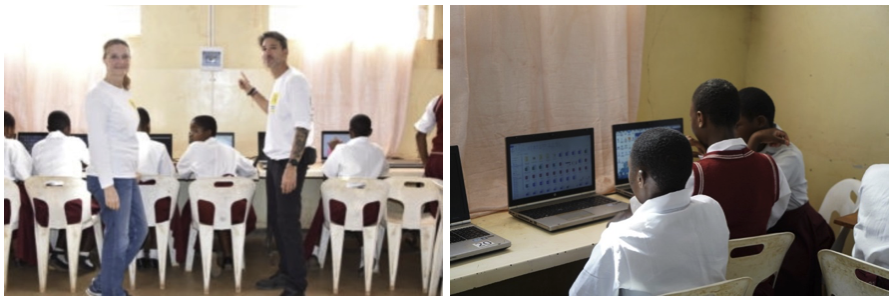
ENGIE volunteers from ENERGY ASSISTANCE Belgium have helped improve the educational landscape for 600 girls at Likuni Girls’ Secondary School in Malawi, by installing solar panels and batteries.
Malawi faces frequent power cuts that disrupt the learning process. Solar power is a reliable source of energy that not only lights up classrooms, but also contributes to the well-being of our planet.
Lighting the way to education:
Likuni Secondary School for Girls, a boarding school near Lilongwe, caters for 600 girls. The solar system not only lights up the classrooms after dark (around 5 p.m. because of the latitude), but also powers 30 computers, providing access to modern educational tools. We passionately believe that every girl deserves a chance for a bright future, and that access to education is the key.
Although the school is connected to the local grid (ESCOM), persistent power cuts led to the installation of 22 photovoltaic panels and 4 lithium batteries as back-up. The panels were placed on the roof of the school building, and a restored technical room now houses the solar control equipment, electrical boxes and batteries. The solar system (10kWp with a storage capacity of 19.2kWh) ensures a continuous power supply to classrooms, the computer room and the administration block during blackouts.
Towards sustainability and ecological friendliness:
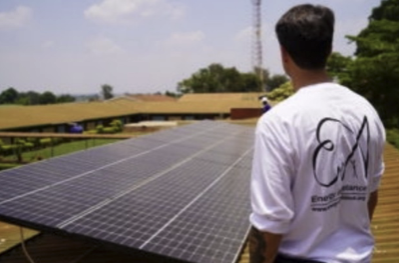
In addition to the classrooms and administration block, the dormitories, kitchens, etc. are still not connected. A feasibility study is underway to supply the kitchen with biogas. This would enable daily meals to be prepared without the need for electricity or firewood, and provide biofertilizer for the vegetable garden, thus offering an environmentally friendly solution. The aim is to combat deforestation and improve the school’s self-sufficiency.
Promoting biodiversity for a sustainable future:

As part of its commitment to sustainable development, Likuni Girls’ Secondary School is committed to planting 800 indigenous trees. This planting aims to reforest areas of Lilongwe most affected by deforestation (for firewood and charcoal) and to teach girls the benefits of having trees nearby. Trees planted along watercourses aim to reduce flooding during the rainy season, which is particularly dramatic given the floods that have hit Malawi in recent years.
